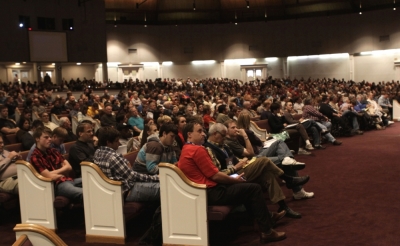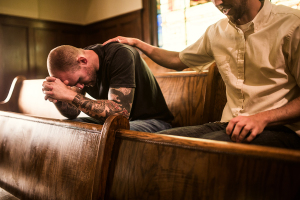When your church doesn’t want you
A few weeks back, I wrote an update on a subject that I see as a serious problem in today’s church, which is a breakdown in educating church members on what and why they believe. During my failed attempt at trying to get the pastors of my church to consider the issue, I experienced something else that surprised me.

In addition to rejecting my offer to help with education, they also turned me down to help with, well, anything.
Given I’ve just retired from my software career and have more time to devote to Christian service, I had hoped that one area open to me would be to volunteer at my church and assist with things like teaching, marriage mentoring and other one-on-one opportunities.
But just like my offer to help with education was met with a ‘meh’ response, I got the same talk-to-the-hand reaction to my other offers of help.
When I expressed surprise about them not needing my help in any area of the church, one of the ‘connection’ pastors said I could help with service setup, communion cup filling, etc. Make no mistake, I’m happy to assist with those things, but what I had been hoping for was everyday service and not just Sunday service.
Naturally, the experience had me thinking, “Geez, it’s gotta be me; they must just think I’m some weird dude with too much time on his hands.” But then I started talking to some of my friends at other churches about my experience and got similar stories.
What’s going on?
The Age of the Professional Church
In my software career, I’ve worked in both small and large corporations for decades and I know corporate structure and attitude when I see it. And I see it in many churches these days.
A lot of churches have adopted the same organizational chart structure, marketing tactics, meeting mindset (e.g. offsite huddles), red tape bureaucracy, and insider/outsider posture of typical corporations. And in the same way that secular companies don’t engage those outside its walls from a contribution standpoint, today’s professional church has sealed off its areas of involvement where the congregation is concerned except for menial tasks.
In typical corporate style, many in church leadership today see you not so much as a participating member of Christ’s body, but as a customer or patron of the church. And since you, as a customer, don’t actually ‘work’ for companies you patronize, your involvement at church is reduced to being next to nothing.
At best, you may be considered for worker bee things like preparing/breaking down Sunday service, food campaign drives, opening a home for a small group (similar to a bible study without any real bible study) or providing manual labor for yearly community events.
The sad thing is, when the church neuters its members in this matter, they overlook the fact that every born again believer has been given spiritual gifts by God that are to be used in the body of Christ. But what if church leadership disallows the exercising of those gifts in the body?
Church Staff Only?
There are several chapters in the New Testament that mention spiritual gifts, including the 12th chapters of Romans and 1 Corinthians. Are the gifts mentioned there only for those who serve in ministry full time?
Not at all. The gifts distributed by the Holy Spirit are for all believers and not just those on a church’s payroll. The question is, if today’s corporate church bans members from using their gifts within that particular body, how and where are believers supposed to exercise their gifts?
Some Sympathy for the Church Leadership
On the one hand, I get that this issue can be a hard one. We need to understand the very real struggles church leadership has with members who are not gifted whatsoever in the areas they want to serve. I’m thinking of the person who sings like a wounded coyote but wants to be on the vocals team, the guy who wants to teach but is just plain bad at it, the woman who wants to lead church campaigns but is incredibly disorganized, etc.
These are awkward conversations for the church leadership to have with those people for sure, but they are discussions that have no doubt taken place for as long as they church has been in existence. Such situations are no reason to throw the baby out with the bathwater and completely banish congregant participation in a local body of Christ, especially when many aids exist to help Christians discover their true spiritual gifts and put them to use.
So What Did I Do?
Since my church showed me the door where volunteering with them was concerned, I decided to do two things.
First, my wife and I (with regret) left our church where we’ve attended for decades and are now praying and asking God to lead us to a new church where we can actually be involved and useful to the body of believers there vs. just being pew warmers.
Second, we’re working on using our spiritual gifts outside the church in other organizations, some of which are Christian and others that are not. The welcoming spirit we’ve experienced in those places is, happily, much more in line with what we expected from our previous church.
It’s my hope that more churches get past their staff-only participation mindset and allow their members to flex the spiritual muscles with which the Holy Spirit has gifted them. Doing so can make the difference between operating in an anti-biblical way like the secular world does vs. the way God intended.
Robin Schumacher is a software executive and Christian apologist who has written many apologetic articles, appeared on nationally syndicated radio programs, and presented at various apologetic events. He holds a Master's in Christian apologetics and a Ph.D. in New Testament.



























